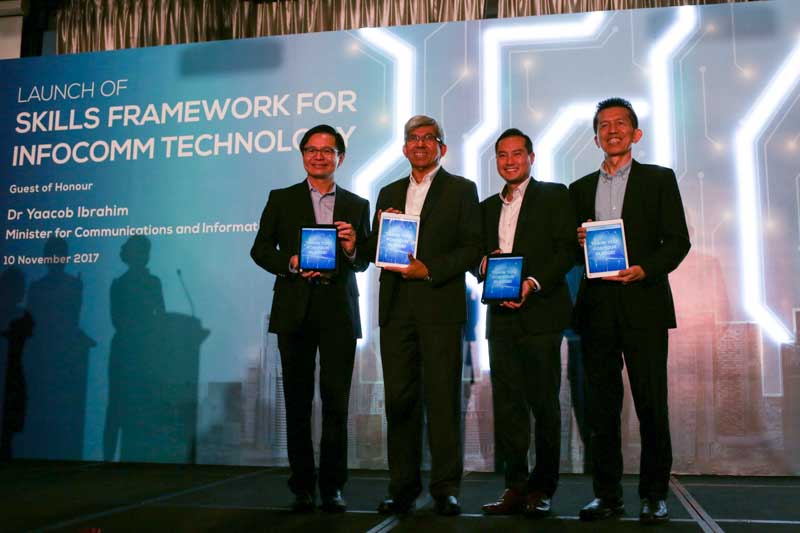
Featured image (from left): Mr. Ng Cher Pong, Chief Executive, SkillsFuture Singapore (SSG), Dr. Yaacob Ibrahim, Minister for Communications and Information (Guest-of-Honour), Mr. Tan Kiat How, Chief Executive, Infocomm Media Development Authority (IMDA) and Mr. Goh Eng Ghee, Deputy Chief Executive, Workforce Singapore (WSG) at the official launch of the Skills Framework for ICT. Photo: Dean Koh/OpenGov Asia.
Companies and individuals can now enjoy better access to the skills and career pathways required for new, in-demand infocomm technology (ICT) roles – including Chief Digital Officer, Data Scientist, Cyber Risk Analyst, and more.
The Skills Framework (SF) for ICT is a comprehensive guide on the ICT skills and employment opportunities, and maps out the career pathways across seven tracks [1]. It also covers 119 job roles and over 80 existing and emerging skills within the ICT sector, and across other industry domains such as retail, logistics, finance and healthcare.
The SF for ICT empowers companies and individuals to self-help and benefit from a common, national skills and career planning resource to identify and acquire the necessary ICT skills, and stay plugged into the latest programmes available for career development, reaping the benefits of Singapore’s digital economy.
“Singapore is on the cusp of an exciting digital transformation and there are many opportunities in the Infocomm Media sector. The Skills Framework for Infocomm Technology is an important collaboration by the government and industry to help our companies and workers deepen digital capabilities and to pick up new skills to stay relevant. Workers from other sectors can also leverage the Skills Framework to acquire the right infocomm skills needed to participate in an increasingly digitalised economy,” said Mr. Tan Kiat How, Chief Executive of IMDA.
The SF for ICT will also boost companies’ efforts in attracting, retaining and developing ICT talents by using the detailed skills information in the framework to design human resource management and talent development plans. Individuals who wish to build their career in ICT can refer to this framework to identify opportunities in education and training, and plan their ICT career development across the various sectors.
Launch of SF for ICT, a SkillsFuture Initiative in Support of TechSkills Accelerator

Launched by Minister for Communications and Information, Dr. Yaacob Ibrahim (above photo) today, the SF for ICT is jointly developed by the Infocomm Media Development Authority (IMDA), SkillsFuture Singapore (SSG) and Workforce Singapore (WSG), through extensive consultation with over 150 industry leaders from various organisations, industry associations, training providers and unions. The SF for ICT is a SkillsFuture initiative, in support of TechSkills Accelerator (TeSA), and will help individuals and companies develop a skilled ICT talent pipeline to seize opportunities in the digital economy.
Last week, Minister Ibrahim launched the ICM Industry Transformation Map, which detailed the plans to transform the ICM for Singapore’s future economy.
Mr. Ng Cher Pong, Chief Executive of SSG said, “The Skills Framework for ICT is an integral part of the Industry Transformation Map for Infocomm Media. It sets out the manpower and skills development strategies for the sector. SSG, IMDA and WSG, together with industry stakeholders, have developed the Skills Framework for ICT to capture the evolving technology and industry trends, and in particular, the impact on jobs and skills. It will be a “living document” that we expect to update regularly in order to keep pace with changes in this industry.”
Early Adopters of SF for ICT

At the launch, 11 companies (see above group photo) were recognised for their early adoption of the SF for ICT. These companies comprise multinational companies, large and small medium enterprises, and public sector agencies, in alphabetical order; Accenture, Aptiv8, Cyber Security Agency, DBS Bank, GovTech, Integrated Health Information Systems (IHiS), i-SPRINT, PSA Corporation, Quann, Singtel and UrbanFox. As a pilot, these early adopters will align some of their ICT job roles or job functions to the SF for ICT, to improve their talent attraction and development capabilities.
Organisations interested in adopting the SF for ICT as part of their workplace transformation can tap on the consultancy advice offered by Singapore National Employers Federation (SNEF) under the SAPPHIRE initiative. WSG will subsidise 70% of the consultancy fee which will cover up to 100 hours of consultancy advice.
As technology trends and skills continue to evolve, the SF for ICT can support Singapore’s companies and professionals in their pursuit of ICT skills and competencies for their desired job roles, and optimise career pathway mapping to meet the demands of Singapore’s fast- moving digital landscape.
For more details of the framework, please visit www.imtalent.sg/SFforICT.
[1] The Skills Framework for ICT maps out the recommended skills and competencies for job roles across seven tracks comprising: Security, Support, Infrastructure, Data, Professional Services, Software and Applications, and Sales and Marketing.
















